Meet the four women behind WFP’s humanitarian helicopter in Haiti
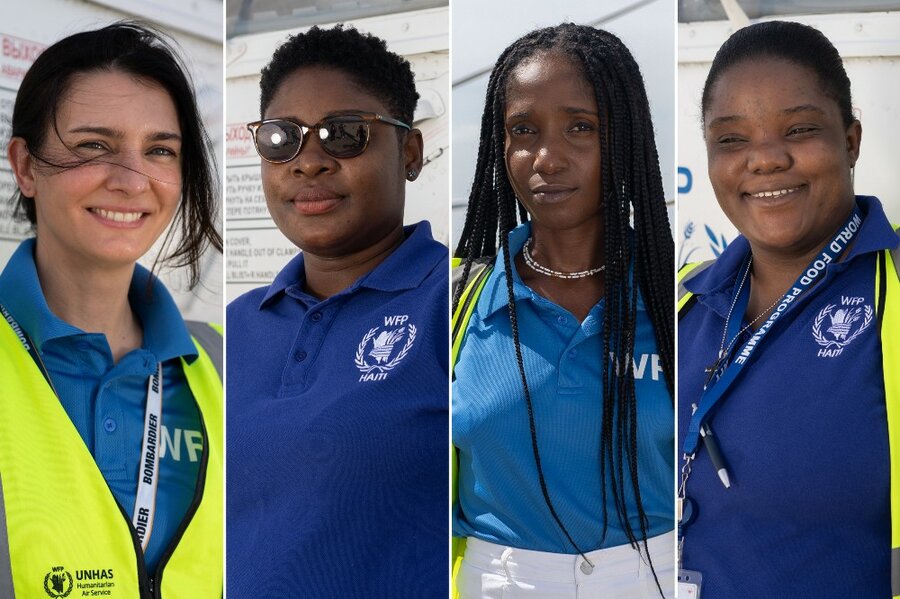
From left to right — Isabel Ruiz-Zaera (Aviation Chief), Jovanie Laguerre (Aviation Officer), Danourah Bien-Aimé (Flight assistant), Robine Jean-Baptiste (Flight assistant). Photo: WFP/Antoine Vallas
In the year since the World Food Programme (WFP) deployed a MI-8 AMT helicopter to serve the entire humanitarian community in Haiti, the WFP-run United Nations Humanitarian Air Service (UNHAS) in the country has transported 3,000 humanitarian workers and 60 tons of cargo from 69 different organizations, including medical and frontline staff, medicines and hospital equipment, to hard-to-reach areas.
It takes four busy bees in the WFP office to keep the humanitarian helicopter in the sky everyday. Isabel, Jovanie, Robine and Danourah manage every aspect of the air operation from bookings and schedule to flight authorisations, last-minute cargo requests, security and keeping track of maintenance and crew rotations.
Isabel Ruiz-Zaera, Aviation Chief
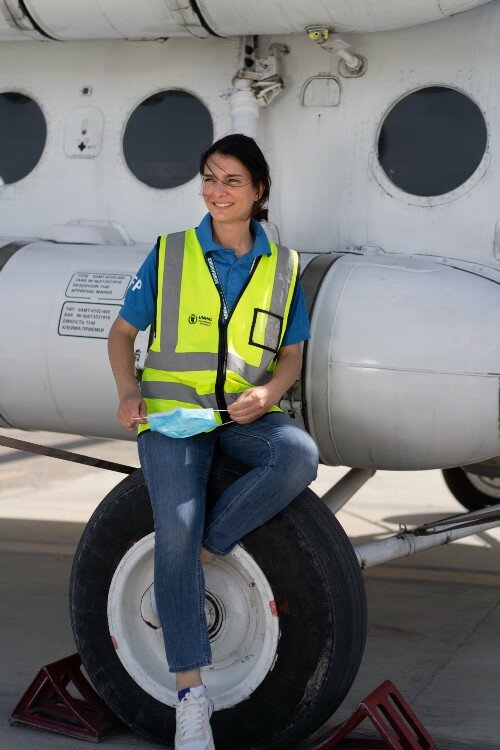
Isabel leads the UNHAS team in Haiti. Photo: WFP/Antoine Vallas
“As a child I used to lie down on our terrace and spend hours counting the planes above my head,” Isabel says.
The Barcelonian never thought of any other job than aviation. After getting her pilot license at 18, she quickly embarked on a career that would take her to the skies of Cote d’Ivoire, Afghanistan, Italy, Mali, Niger, and now Haiti.
“As a child I used to lie down on our terrace and spend hours counting the planes above my head.”
Isabel joined WFP in 2017 after several stints at the UN Department of Peacekeeping Operations.
“I’ve always needed excitement in my job,” she says. “In aviation, every day is a puzzle, and you have to think outside of the box to fulfil what at first seem like impossible requests.” That’s how she recently found a solution to fly an x-ray machine to La Gonave, an isolated island off the coast of Haiti where medical infrastructure is particularly poor. “It is so rewarding to read the many thank-you emails from the manager of the medical organization we are serving — a simple flight is changing the life of a community. This is what gets me up in the morning,” she says.
When asked about her brother, a history teacher in Barcelona, Isabel starts spelling his name in military alphabet: “LIMA, UNIFORM…” — she catches herself.
“I mean L, U, I, S — Luis. His name is Luis.”
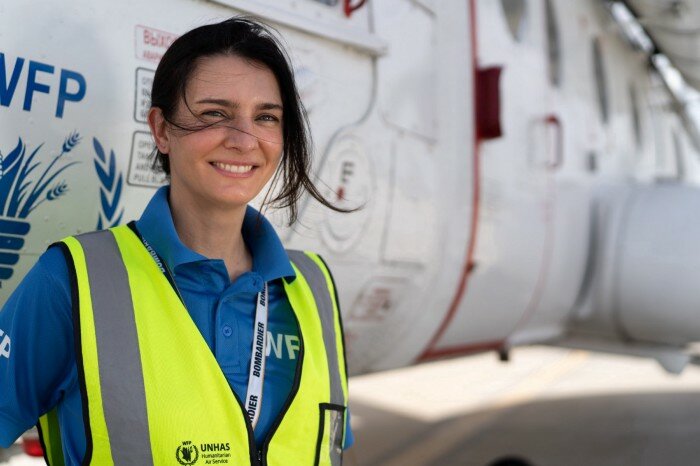
Isabel crossed the skies of Cote d’Ivoire, Afghanistan, Italy, Mali, Niger and now Haiti. Photo: WFP/Antoine Vallas
Jovanie Laguerre, Aviation Officer
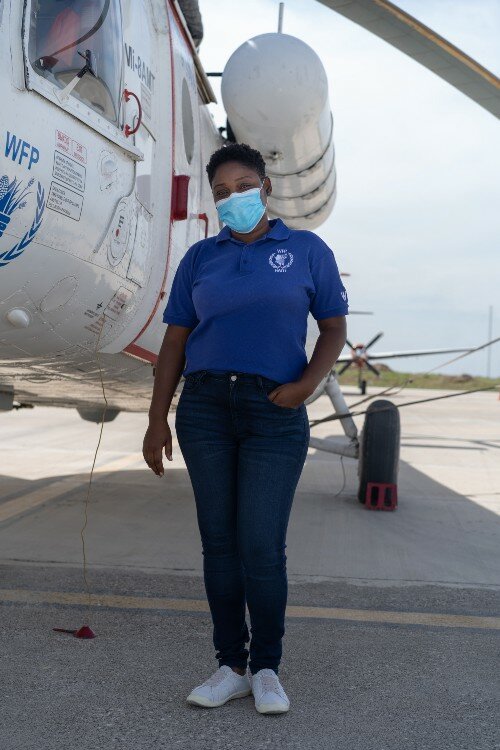
Jovanie was born in Jeremie, south of Haiti, now a regular destination on the UNHAS flight schedule. Photo: WFP/Antoine Vallas
“My first time on a helicopter was in 2006. I wasn’t afraid,” Jovanie recalls.
Aircrafts are not a rare sight in Jeremie, south of Haiti, where Jovanie grew up. But after studying business administration and industrial technology, she came into aviation by accident. When the United Nations Stabilization Mission in Haiti (MINUSTAH) started its mandate in 2004, she applied for a job and was assigned to work as an inspection and quality control assistant, where she learned the skills that would later land her a gig with the aviation team.
“I didn’t even know WFP had helicopters.”
Of her 15 years in aviation, the last one has been at WFP, where she takes care of bookings, schedules and maintenance.
“I didn’t even know WFP had helicopters,” she says. “I thought they just gave food!”
Robine Jean-Baptiste, flight assistant
“My uncle was in aviation, my mom worked for Air France,” recalls Robine. “It runs in the family,” she says.
And yet, Robine studied law. “I was supposed to finish my law degree this year, but it was suspended due to COVID-19,” she says. So she applied for a job with WFP and soon found herself on the UNHAS helicopter. “The landscapes made me forget that I was scared,” she admits.
As a flight assistant, 25-year-old Robine helps to arrange and monitor flights and guides passengers and cargo onboard. And she has now decided to stay in aviation and logistics. “Every flight is as exciting as the first one, and flying equipment to first responders and taking humanitarian staff to emergencies on the ground is infinitely rewarding,” she says.
“The landscapes made me forget that I was scared.”
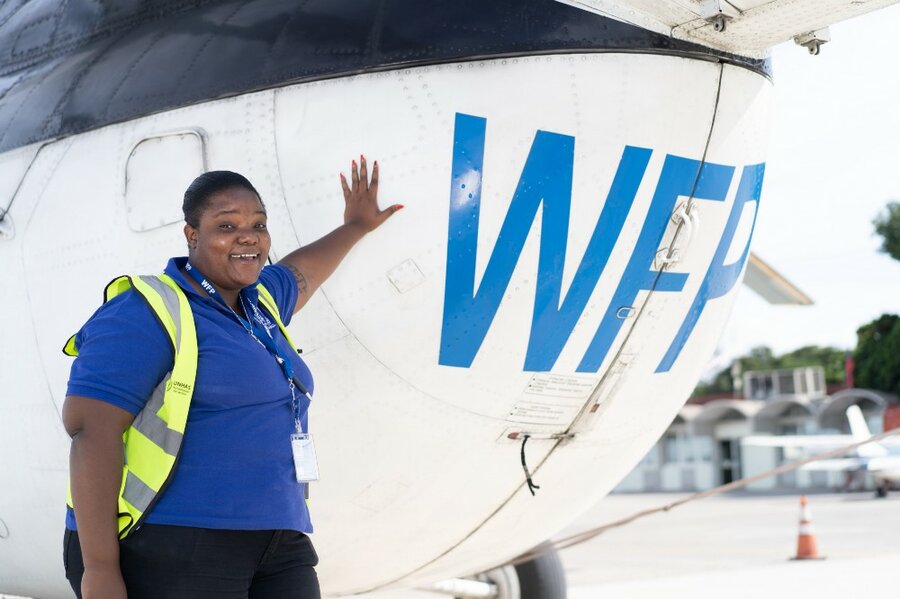
Robine is 25 years old and helps to arrange and monitor flights, as well as guide passengers and cargo onto the aircraft. Photo: WFP/Antoine Vallas
Danourah Bien-Aimé, flight assistant
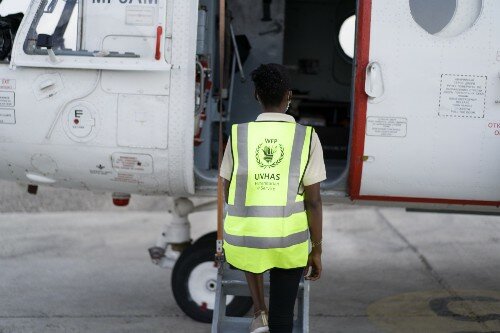

Left: Danourah steps into the UNHAS helicopter in Port-au-Prince, Haiti. Right: Danourah flies over Gonaives, the second largest city of Haiti, in the UNHAS helicopter. Photo: WFP/Antoine Vallas
“Privyet, kak dela?” (“Hi, how are you?”) says Danourah to the Russian pilots every morning when she hops onto the WFP helicopter. Before she joined WFP, the 26-year-old Haitian never thought she would speak a word of Russian — let alone in the Carribbean sky. But she does now, as a flight assistant for UNHAS.
Danourah was not born a humanitarian, but on January 10th, 2010, her life was rocked by the earthquake that ravaged Haiti and would forever change the destiny of her country, killing more than 200,000 people and leaving millions injured and displaced.
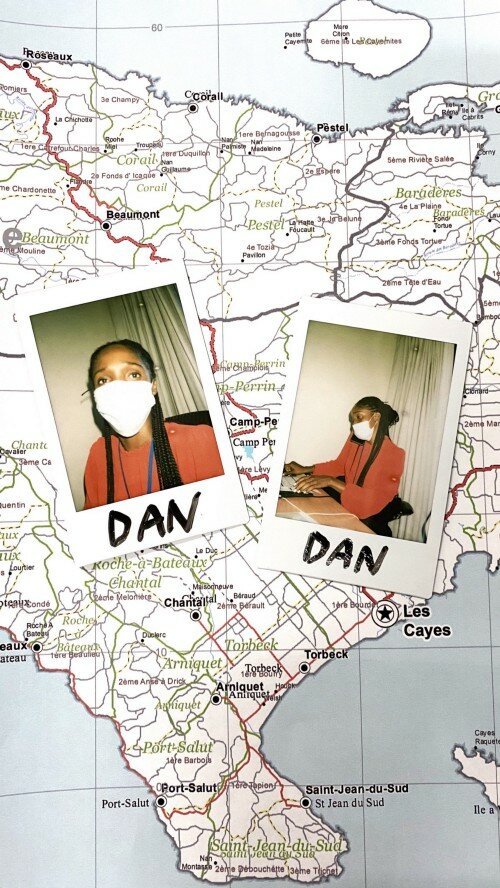
Danourah in the WFP office in Port au Prince, Haiti. Photo: WFP/Antoine Vallas
“I was at school with my younger sister and just getting out of a physical education class when the ground started shaking. We ran out just before the building collapsed, but it was only when I saw the dust and heard the screams rising from all around the neighborhood that I understood how serious this was,” she recalls.
Danourah’s father, who was working for the United Nations Stabilization Mission in Haiti (MINUSTAH) at the time, took her for a ride across town the next day in his car. “We would hear screams and wailing rise from the city every night for weeks, maybe months,” she says.
So a few weeks after the earthquake, Danourah enrolled to volunteer at an orphanage taking care of children survivors. It was her introduction to social work, which then led her to the humanitarian world, flying on another UN helicopter 10 years after her father flew on one for MINUSTAH.
It is no coincidence that Danourah’s last name, Bien-Aimé, means “Loved”.
WFP thanks Canada, the European Union (ECHO), France, Germany, Spain, Switzerland and USAID for their generous and consistent support to common logistics services in Haiti, including to the United Nations Humanitarian Air Service (UNHAS). UNHAS urgently needs US$700,000 to continue operating in Haiti and US$4.4 million to sustain the service in 2021.
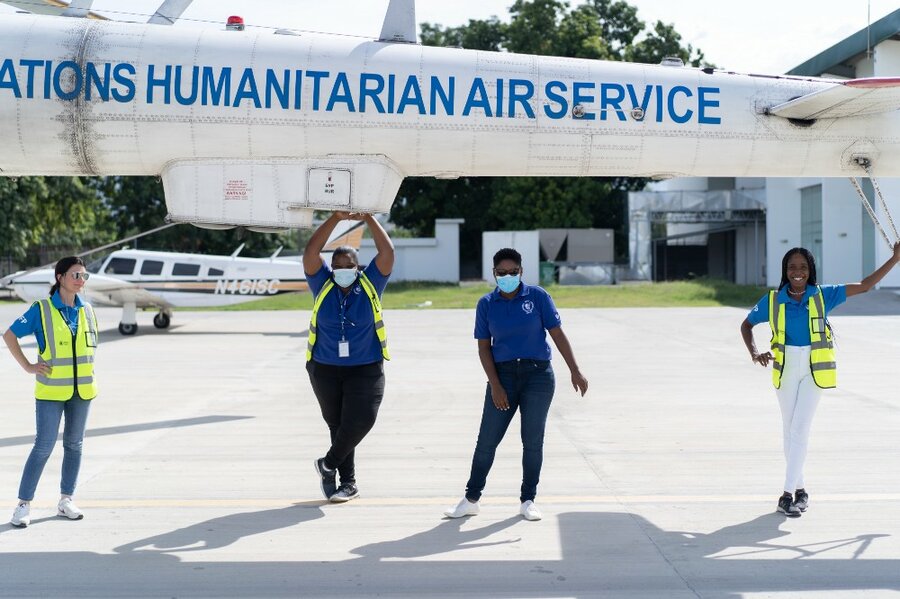
From left to right: Isabel (Aviation Chief), Robine (Flight assistant), Jovanie (Aviation Officer), Danourah (Flight assistant). Photo: WFP/Antoine Vallas


